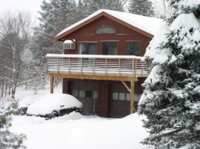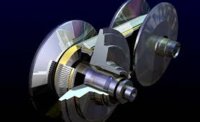Bob Kelly III
Ranch Kid from way back,.... that got Old !
RT: Love your Job buddy ! not many people can do that... get on the net and be at work too ! LOL
hahaha !
Bob......
hahaha !
Bob......
2M: Please don't misunderstand me to be an Absolutist, as I am far from that. Like you, I don't trust the measurement values that manufacturers provide to me, so I do my own calibrations. E.g. my many tire gauges all have + or - correction values written on them. And I'm perfectly comfortable pushing that axle nut two more degrees in order to get the pin in place. And Pirsig, who was a technological Master who I greatly respect, trashed service manuals for about three chapters, as I recall. He actually wrote them for many years, and saw through their Divine status the publishers wanted to imbue to them. "Carefully" reading them meant reading them discerningly.Heavy stuff, Dude.
Suppose you had your choice of 3 different shops to wrench on your bike.
1- A busy shop, sounds of tools clanking, compressors and power tools.
2- A rad shop with heavy metal, acid rock at full blast.
3- A shop staffed by fully cranked meth heads.
I take torque settings as part of an overall maintenance philosophy, subject to interpretation. The published values are for all things in new to good factory OEM serviceable condition. Adjustments based on education and experience if you're outside that realm. Especially in emergency situations.
Also, not all published torque values came out of the engineering department, and were written by a tech writer that may have hit the wrong key.
A comment on tire pressure gauges. I compared my air gauges a few years ago. The top gauges are all within 2psi, the middle three are about 5psi off, the bottom one failed. Which ones are correct? Are yours?
View attachment 106425


Same here, all of the above, and more. I do a thorough brake maintenance in the spring and fall, dismantling the calipers, cleaning the SS hardware, de-rusting contact surfaces,, and lubing the caliper sliders. Unfortunately, the 2012 Altima demands this.I use anti seize on lug nuts!
I even smear a light coat of anti seize on the hub/wheel interface. If you aren't in the rust belt doing your own twice a year wheel changes you won't get this.
I drive a 2005 Camry. The only brake maintenance I've done is replace the brake pads.Same here, all of the above, and more. I do a thorough brake maintenance in the spring and fall, dismantling the calipers, cleaning the SS hardware, de-rusting contact surfaces,, and lubing the caliper sliders. Unfortunately, the 2012 Altima demands this.
Yeah, you are in a bad snow belt there. You really need those full winter tires. Here in Calgary, where we are in the lea of the mountains, we don't get much snow, although large dumps are possible. I use the Nokian WRG2 tires that are winter rated, and I run them all year round. They are amazing tires for our winter conditions, and I feel very safe with them. As a matter of fact, I need to replace them, and will be buying the Nokian WRG3 next week.
We do get a bit of snow, here.Yeah, you are in a bad snow belt there. You really need those full winter tires. Here in Calgary, where we are in the lea of the mountains, we don't get much snow, although large dumps are possible. I use the Nokian WRG2 tires that are winter rated, and I run them all year round. They are amazing tires for our winter conditions, and I feel very safe with them. As a matter of fact, I need to replace them, and will be buying the Nokian WRG3 next week.



2M: Please don't misunderstand me to be an Absolutist, as I am far from that. Like you, I don't trust the measurement values that manufacturers provide to me, so I do my own calibrations. E.g. my many tire gauges all have + or - correction values written on them...
Although the altitude has increased 5 to 6 K feet, it will still read 30, yes?Haha, no, of course not. But, this is a *fun* thread, challenges the preconception and thinking. How 'bout this:
At home, you've aired-up a steel tank to 30 psi, confirmed with your tire gauge. Travel to Denver, and take another reading. What will it show?
